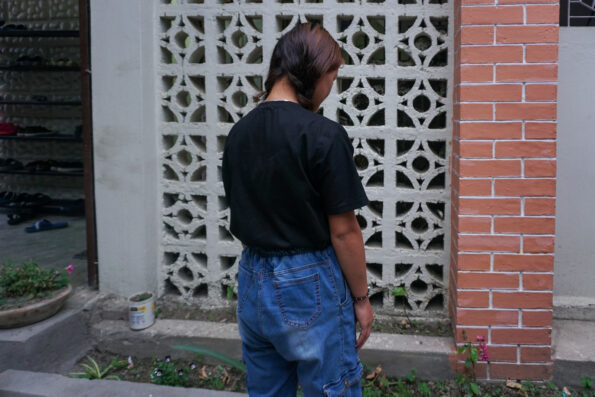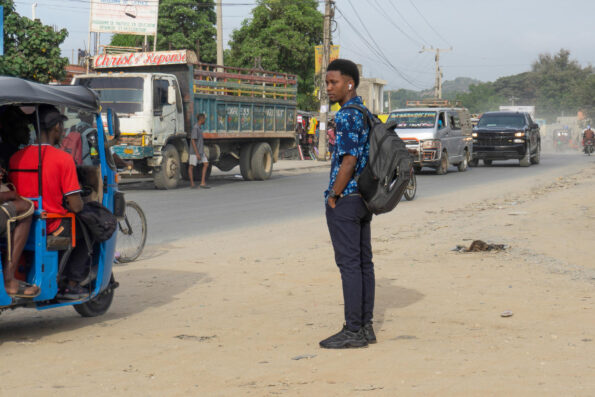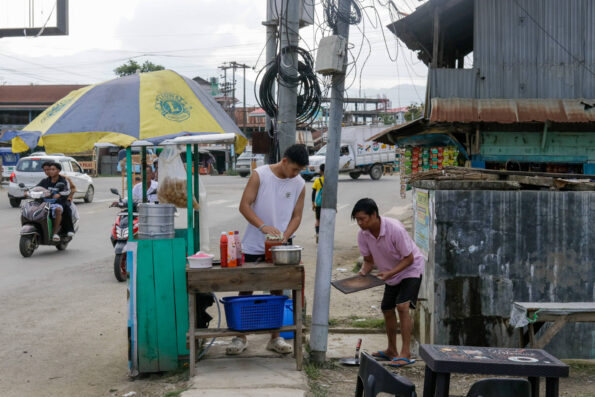
Noella Nyirabihogo, GPJ DRC
Rwabahene, 24, crosses from Democratic Republic of Congo into Rwanda every day to fetch fresh water from taps there. Clean water isn’t accessible to most Congolese, so a growing number of people including Rwabahene, who asked that just his second name be used, have made a business of carrying clean water back to DRC to sell. A 20-liter container in Rwanda costs the equivalent of about 3 cents, while the same container is sold for 1,000 francs ($1) in DRC.
GOMA, DEMOCRATIC REPUBLIC OF CONGO — From dusk till dawn, an ongoing stream of people crisscrosses La Petite Barrière, one of the two main borders that divide Rwanda and DRC.
Women carry baskets full of vegetables, potatoes and fish. Men carry buckets of cow meat, the blood oozing down their backs and through their clothes. Schoolchildren in uniform cross too, sometimes on bicycles but mostly on foot.
But the most common sight is of men, women and girls who carry jerry cans filled with water. The heavy jugs are tied to their foreheads and hang down their backs, or are balanced on bikes.
INSIDE THE STORY: Having lived without access to clean water for decades, more Democratic Republic of Congo residents are crossing the border into Rwanda to access it from that country’s taps. GPJ’s Mariam Aboubakar Esperance hopes her coverage of the issue will get powerful people to pay attention to the problem and fix it and make clean water accessible in DRC. Read the blog.
Where clean water is a rare commodity, small-scale trading in the resource is lucrative. Savvy entrepreneurs are quickly filling the need for affordable water by taking advantage of nearby Rwandan water taps, where that country’s developing infrastructure now sends clean water.
“Maji ya Rwanda, Maji ya Rwanda,” shout the vendors. “Water from Rwanda, water from Rwanda.”
People who hear the vendors understand their meaning: The water is drinkable, unlike the water in DRC.
Buyers get what they can according to their means. Some take five liters and others take 20. The price varies, depending on how far away from the border it’s sold. A 20-liter can sold close to the Rwandan border costs 500 Congolese francs (50 cents). But residents from neighborhoods deeper into Goma, the capital of the North Kivu province, pay 1,000 francs ($1) for the same amount.
Blandine Nizeyimana, 26, says she couldn’t afford mineral water, the bottled variety that is common among international aid workers and other foreigners in DRC.
“It occurred to me that I should begin crossing into Rwanda to buy 10 liters of water for my family,” she says.
Once she started getting water from Rwanda for her family, neighbors came to her house in Himbi, a middle-class neighborhood in Goma, with cups, asking for water to drink.
“It wasn’t until that very moment that I mulled over an idea to sell water,” she says.
Nizeyimana rented a bike so she could carry five 20-liter cans at a time.
“And people rushed to buy the water,” she says.
Now, Nizeyimana sells more than 500 liters of Rwandan tap water each day.
People who can’t afford to buy clean water rely on the salty water from Lake Kivu, which they use for everything laundry to cooking and drinking.
DRC is among the world’s most water-rich countries, but most people can’t access it. According to one report by African Ministers’ Council on Water (AMCOW), 50 million Congolese people, or 75 percent of the entire population, have no access to safe water.
The country’s ongoing insecurity, which is most pronounced in eastern DRC, is the biggest factor in the lack of access to safe and clean water, according to a report by the United Nations Environment Programme. The 2011 report suggests that successive wars have devastated DRC have destroyed the country’s infrastructure, limiting opportunities for water development.
And in the North Kivu province, particularly in the city of Goma its suburbs, the 2002 eruption of Mount Nyiragongo, the area’s most active volcano, damaged the still under-developed drinking water infrastructure, says Étienne Nyamiriri, head of REGIDESO, the water treatment and supply company in the province.
In the face of tremendous odds, a growing number of Congolese see the lack of water as a money-making opportunity.
Juvenal Bangabubika, a 30-year-old father of three, says the opportunity brought him a job, which something he’s sought for a long time.
“I am able to support myself and my family because selling water from Rwanda has been a business opportunity allowing me to earn at least $5 per day,” he says.
Bangabubika says he and his family drink Rwandan water, too.
“Every day I have to come back home with five liters of water as I have to make sure that each and every member of my family consumes safe and clean water,” he says.
They drink it directly from the container, he says.
Mwamini Bihire, a 30-year-old housewife, is skeptical of Lake Kivu’s water. It should be used to wash clothes and for other household chores, but she fears that drinking it could give her a disease like typhoid.
“Whoever has love and regard for their life shouldn’t drink it,” she says.
So far, Nyamiriri, of REGIDESO, says efforts to supply clean water to Goma haven’t been successful.
“We attempted to supply Goma with fresh water from local water sources but the closest water source is located in Masisi,” he says, referring to a rural area northwest of Goma. “We conducted a study to explore the feasibility of treating this water and constructing water supply systems helping distribute water from sources to this area. However, this source itself has a limited flow, and cannot contribute to meeting all of Goma’s water needs.”
There is another source of fresh water near Rutshuru, another rural area, but the costs associated with using that water are high because it’s so far away, he says.
“REGIDESO has always conducted advocacy with donors, but unfortunately unsuccessfully because so far no donor has been interested in funding the construction of water supply systems,” he says.
As a result, the need for clean water in Goma continues.
Nizeyimana says the possibility of having potable water in Goma “would be a miracle of God’s doing,” but it would also impede her thriving business.
“We’re just used to living like this,” she says. “We always talk about water problems but nothing really gets changed.”
Ndayaho Sylvestre, GPJ, translated this article from French.






